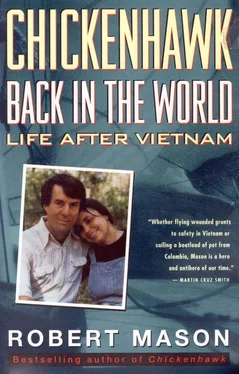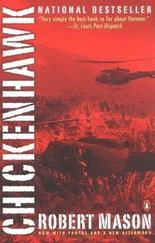Robert Mason - Chickenhawk - Back in the World - Life After Vietnam
Здесь есть возможность читать онлайн «Robert Mason - Chickenhawk - Back in the World - Life After Vietnam» весь текст электронной книги совершенно бесплатно (целиком полную версию без сокращений). В некоторых случаях можно слушать аудио, скачать через торрент в формате fb2 и присутствует краткое содержание. Год выпуска: 2013, Издательство: BookBaby, Жанр: Старинная литература, на английском языке. Описание произведения, (предисловие) а так же отзывы посетителей доступны на портале библиотеки ЛибКат.
- Название:Chickenhawk: Back in the World - Life After Vietnam
- Автор:
- Издательство:BookBaby
- Жанр:
- Год:2013
- ISBN:нет данных
- Рейтинг книги:3 / 5. Голосов: 1
-
Избранное:Добавить в избранное
- Отзывы:
-
Ваша оценка:
- 60
- 1
- 2
- 3
- 4
- 5
Chickenhawk: Back in the World - Life After Vietnam: краткое содержание, описание и аннотация
Предлагаем к чтению аннотацию, описание, краткое содержание или предисловие (зависит от того, что написал сам автор книги «Chickenhawk: Back in the World - Life After Vietnam»). Если вы не нашли необходимую информацию о книге — напишите в комментариях, мы постараемся отыскать её.
Chickenhawk: Back in the World - Life After Vietnam — читать онлайн бесплатно полную книгу (весь текст) целиком
Ниже представлен текст книги, разбитый по страницам. Система сохранения места последней прочитанной страницы, позволяет с удобством читать онлайн бесплатно книгу «Chickenhawk: Back in the World - Life After Vietnam», без необходимости каждый раз заново искать на чём Вы остановились. Поставьте закладку, и сможете в любой момент перейти на страницу, на которой закончили чтение.
Интервал:
Закладка:
In one small corner of this huge military installation is a small group of buildings called the Eglin Federal Prison Camp. The camp was indistinguishable from the other buildings on the base. There were no fences, no walls, no guard towers. Just a cluster of buildings with a sign out front. We walked into the administration building. A guy dressed in blue asked us what we wanted.
“We’re checking in,” I said.
“Everybody’s at lunch,” the man said. “Take a seat.”
We sat.
After lunch, a man came down the hallway. “Robert Mason and John Tillerman?”
“Yessir.”
“Welcome to Eglin Prison Camp, men.” The man, Captain Raulings, looked at Patience and Alice and said, “You should say good-bye to your ladies now. They can come visit you tomorrow. Visitors can come Saturday and Sunday.”
I hugged Patience while tears spilled down her cheeks.
I stood in the hall with my bag and my tennis racket and my bamboo flute, feeling like a recently orphaned immigrant.
“Okay, men,” Captain Raulings said. “Let’s check in.”
While we filled out forms in a small room, Captain Raulings came in and said that the warden wanted to see me. “The warden never sees new prisoners,” he said. “You must be a real fuckup.”
Although everybody called the head of Eglin Prison Camp a warden, he was officially a superintendent. Superintendent Robert Honsted had a large office. He invited me to sit.
“Mr. Mason,” he said, “because of all the publicity about you coming here, you are what we call a high-profile prisoner. That means we have to treat you differently than the rest of the prisoners. You won’t be allowed to work on the Air Force base like most of the prisoners do. You’ll be confined to the camp. We don’t want reporters interfering with day-to-day prison business, as might happen if you’re out on the base, in public.”
I said I understood, though I thought the designation high profile was a little extreme.
“What was the name of that book you wrote?”
“ Chickenhawk .’’
“Is it any good?”
“I guess so.”
“Maybe I’ll buy a copy.” Honsted stood up. I got up. “Okay, Mr. Mason. Good luck.”
When I returned to the in-processing routine, a guard checked my bag. When he found four large vials of Valium he just grinned and said, “Nice try.”
“They’re from the VA. I need them,” I said.
“Naw. You won’t need this junk here. We’ll get you nice and healthy with good clean exercise.”
I also had a dozen bottles of Maalox the VA had given me for my constant heartburn. I’d gone in and told the shrink who I’d been seeing for a couple of years that I was going to jail and asked if she could give me a bunch of my Valium and Maalox. She’d said sure, and I had eight hundred pills with me. The guard said they’d send them home.
An hour later we stepped out the other side of the administration building as processed, numbered, blue-uniformed federal prisoners. John and I wore blue work clothes with pants that didn’t come within six inches of the ground, wearing work boots, carrying our stuff in grocery bags. A guard named Thompson, rotund and cherub-faced, led us down a sidewalk toward a low green building he said was Dorm Three. I heard the loud roar of a jet and turned to watch an F-16 fighter making a nearly vertical takeoff. The camp was about a mile from the main runway.
“Whatever you do, boys, be sure you are at your bunks during the count. Don’t fuck up.’’
“When’s the count?” John said.
“They announce them on the loudspeakers. Everybody’s expected to be in their space. If you’re not, you’re in big trouble. Now, here in Dorm Three—everybody starts out in Dorm Three—you just got a bed. You’re expected to be standing at the foot of your bed during each count except the counts after lights out. At night, you’re allowed to be in your bed.”
Dorm Three was a low, old, and uneven frame building. “Everybody starts out here?” I said.
“Yeah. You live here for a few months and then they’ll assign you a cube in one of the other dorms.”
“A cube?” I said.
“Yeah. You’ll see. Four by seven feet, shoulder-high partitions, a bed and a chair.” Thompson shrugged. “Cube.”
Dorm Three was like an oven, the air hot and humid. The ceilings were low. The walls were green. The floors were waxed linoleum tile buffed to a brilliant shine. The long building was divided into four sections: A, B, C, and D. Thompson led us to section A and showed John his bed, the lower bunk of a bunk bed. Then he led me to section D and showed me mine. “Enjoy,” Thompson said as he left.
I stared at the bunk. This was time travel back to my days as a private in basic training. I knew what to do. There were about fifty men in the section. Mostly they ignored me as I started to make my bed. That’s what a nervous ex-Army person does when he sees an unmade bunk bed: you just naturally shake out the sheets and install hospital tucks and stretch the blankets so tight coins will bounce off.
As I finished, a voice blared from two speakers in the section. “Count time. Count time. All inmates report to your areas. Count time.” There were speakers in every section of each of the five dorms and about twenty more mounted on poles and buildings all over the twenty-eight-acre compound. The speakers would become an integral part of my life.
I stood by my bunk and watched my section fill up with inmates.
People were coming in from the porch outside. A man in his sixties nodded to me and stood at the foot of the bunk next to me. I said hello. He nodded and said hello. He said people called him Doc.
A couple of guys loitered by the door, on lookout for the hacks.
I asked a guy on the other side of me, a sturdy, thick man, why they called them hacks.
“I’m not sure why,” said the man. “Somebody told me it comes from what they call cabs. And whenever you go anywhere in a real prison—not this fucking place—you go with a guard. You take a hack. Sound right?”
“Sounds fine.”
“What’s your name?”
“Bob Mason.”
“Mine’s Don Barnett. You happen to be the writer?”
“I think so. I mean, I’m a writer.”
Barnett smiled and called across the isle. “Hey, Lauder, this is the guy.”
“What guy?” said a suntanned man about my age. He looked over at me.
“The guy who wrote that book you’re reading,” Don said.
Lauder smiled. “No shit?”
I nodded.
“Great book,” Lauder said. “I didn’t know shit about Vietnam. You made me think I was there.”
“Thanks,” I said, unsure of myself. I was not used to meeting people who’d read my book. They had the advantage of knowing a whole lot more about me than I knew about them. I revealed a lot about myself in Chickenhawk , and I figured somebody was going to use my candor against me. I mean, I actually admitted that I’d masturbated in Vietnam. I kept expecting to hear somebody call me a jerkoff.
“They’re coming!” the lookout said. He stepped back to his bunk.
We assumed count position. The man on the top bunk sat with his legs draped over the foot of his bed. The man on the lower bunk stood in the aisle.
Two hacks walked in the door and barked, “Count.” One stayed near the door and the other walked up the aisle nodding at each inmate, counting. When he’d walked up and down each side, he gave the number to the other guard. The guard checked his count sheet and nodded. The two hacks walked out the door to the porch and were gone.
The inmates crowded around the door, chattering like kids, making jokes. I asked Barnett what going on.
“We’re first for chow this week. It rotates among the dorms.” He looked at the eager mob by the door. “They’re going to race to the chow line. Not much happens here. This is a big deal.”
Читать дальшеИнтервал:
Закладка:
Похожие книги на «Chickenhawk: Back in the World - Life After Vietnam»
Представляем Вашему вниманию похожие книги на «Chickenhawk: Back in the World - Life After Vietnam» списком для выбора. Мы отобрали схожую по названию и смыслу литературу в надежде предоставить читателям больше вариантов отыскать новые, интересные, ещё непрочитанные произведения.
Обсуждение, отзывы о книге «Chickenhawk: Back in the World - Life After Vietnam» и просто собственные мнения читателей. Оставьте ваши комментарии, напишите, что Вы думаете о произведении, его смысле или главных героях. Укажите что конкретно понравилось, а что нет, и почему Вы так считаете.












